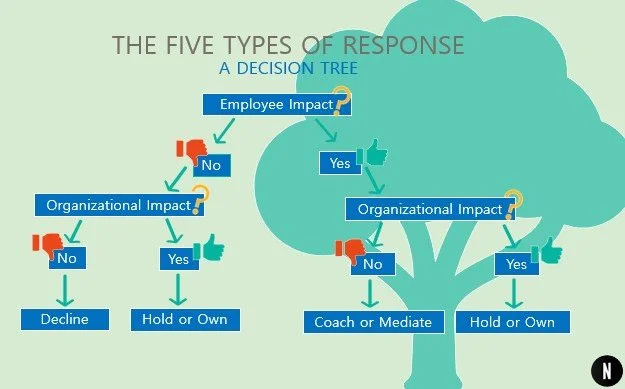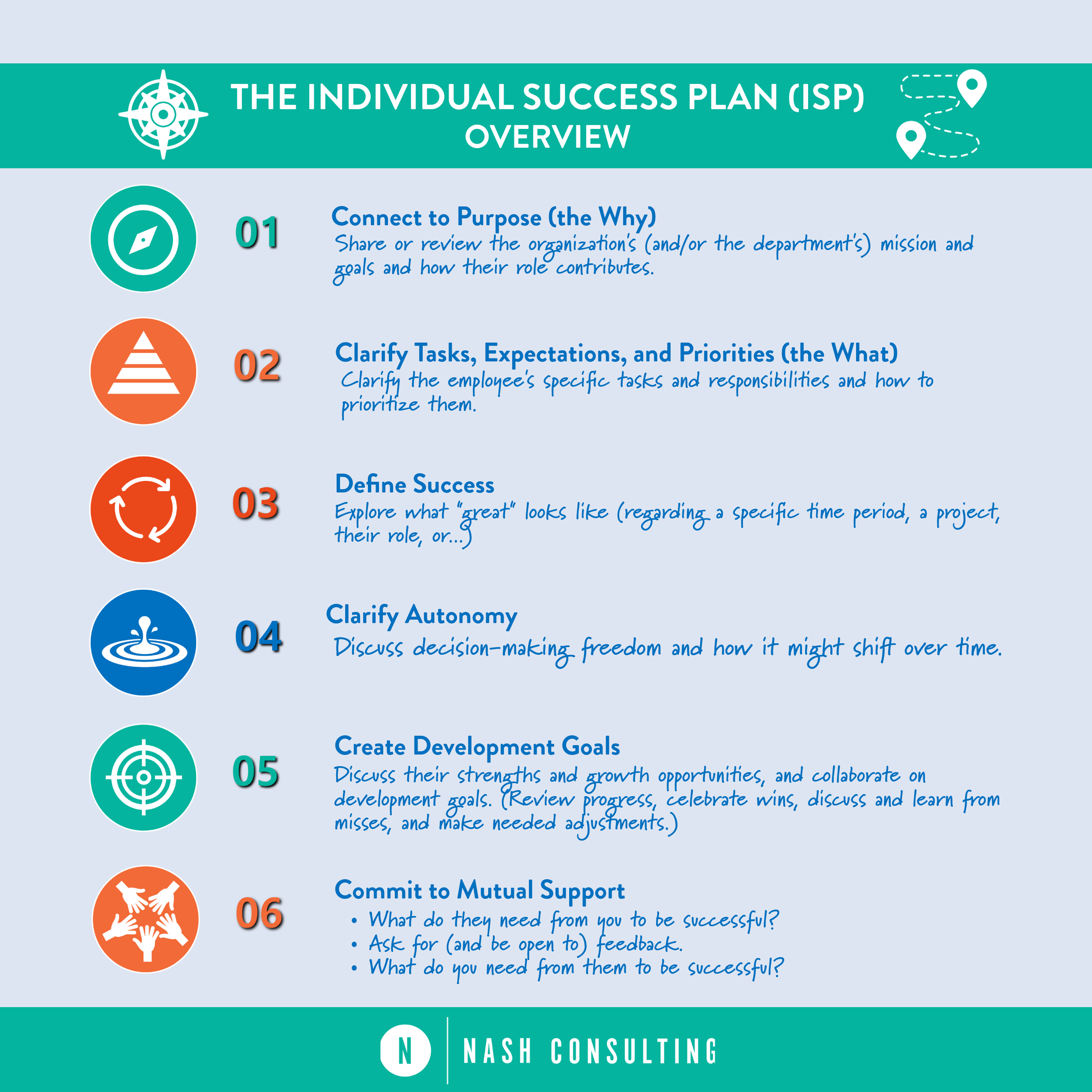
THE MANAGEMENT BLOG
Featured Articles
Articles by Topic:
Adaptive Skills
Today, we're diving into the feels – both yours and your employee's – and how to handle them like the emotionally intelligent leader you are (or aspire to be).
It’s important to keep in mind that when we give someone corrective or critical feedback, it will likely trigger a "fear response" in that person. Here’s how to mitigate that defensiveness.
Four immediately actionable ways (as in, you can do these today or tomorrow) you as a manager can create psychological safety with your team members…and why you should.
Feeling defensive is human. It’s a manifestation of a fear response that takes place in our amygdala fear and triggers our “fight, flight, or freeze” instincts.
Change Management
When management isn’t working, the ripple effects show up everywhere. And yet... time and again, organizations underinvest in management development. Why? Here are four reasons we see all the time.
Most change management strategies are reactionary, but the most effective strategy lies in cultivating a positive, engaged, and high-morale team from the outset.
The true challenge of any training or development initiative lies in keeping the momentum going.
Change management is an art – we must help people work through the resistance so they can accept and embrace change.
Change. We all resist it on some level, whether the change in question is good for us or not. This resistance to change can be the bane of an organization’s existence.
Conflict Resolution
In this article, we’ll introduce two surprisingly simple, powerful tools we’ve seen consistently drive accountability and results. The best part? They take less than 30 minutes to implement as a team-wide standard practice.
Dive into the world of difficult conversations and challenging employee responses, armed with tools to make these interactions win-wins for everyone.
Engage in heated, free-for-all debates that often lead nowhere or consider using a version of the IMAGO conversation process. This approach ensures that everyone's opinions are heard and understood fully.
When skillfully harnessed, conflict emerges as a catalyst for positive transformations: a forge where creativity is kindled, decisions are refined, and bonds are fortified.
Delve into specific mindsets that individuals and teams can adopt to change their perception of conflict and handle it in a way that yields positive team outcomes.
Effective Meetings
It sucks to consistently have critical job duties get pushed into the evenings and weekends because you’re spending a lot of the regular work hours in meetings.
You’re wondering who should be in each meeting, are you? Tough question! The answer to this question is circumstantial. But here’s the thing - big meetings make people sad.
As an agency, we’ve interviewed thousands of leaders and employees, and a common complaint we hear is, “I’m in too many meetings.”
Employees just want to know if they’re influencing, deciding, or neither. They’re usually OK with whichever one it is.
When they’re done right, remote meetings can foster an environment of connection and collaboration where stuff gets done. When they’re done poorly, they can really suck.
Employee Engagement
“The greatest problem in communication is the illusion that it has been accomplished.”– George Bernard Shaw
Your employees are usually fine with how decisions get made as long as they know what style you are using. Are they deciding or are they influencing?
Whether you’re a new manager or a seasoned leader, this article gives you everything you need to roll out ISPs with confidence: a clear overview of the process, ready-to-use checklists, and helpful scripts for each step.
Management processes, such as creating employee development plans and conducting regular one-on-ones, are essential. They create structure. They provide the channels for communication, alignment, and accountability. But if you’re trying to build a leadership culture — not just check management boxes — processes alone aren’t enough.
Discover why genuine appreciation is one of the strongest drivers of engagement—and how managers can use it to build trust, engagement, and motivation.
Giving and Receiving Feedback
Dive into the world of difficult conversations and challenging employee responses, armed with tools to make these interactions win-wins for everyone.
Today, we're diving into the feels – both yours and your employee's – and how to handle them like the emotionally intelligent leader you are (or aspire to be).
It’s important to keep in mind that when we give someone corrective or critical feedback, it will likely trigger a "fear response" in that person. Here’s how to mitigate that defensiveness.
Feeling defensive is human. It’s a manifestation of a fear response that takes place in our amygdala fear and triggers our “fight, flight, or freeze” instincts.
We often find that agencies that have experienced positive culture change attribute a large part of their success to the fact that every employee is regularly meeting with his/her direct supervisor.
Growth Mindset
Change management is an art – we must help people work through the resistance so they can accept and embrace change.
These days, self-compassion and “growth mindset” are terms used frequently in the business word, but frequently disregarded as irrelevant factors of performance.
Feeling defensive is human. It’s a manifestation of a fear response that takes place in our amygdala fear and triggers our “fight, flight, or freeze” instincts.
Listening so people feel respected, showing up non-defensively, controlling our emotional impulses and owning our mistakes – these skills are vital to the health of our relationships.
We're sitting on a planet spinning around in the middle of absolutely nowhere, and our time here is SO brief. The least we can do for ourselves, for others and for the world is find the beauty and the richness and the pleasure in the dailyness of life.
Healthy Teams
“The greatest problem in communication is the illusion that it has been accomplished.”– George Bernard Shaw
Your employees are usually fine with how decisions get made as long as they know what style you are using. Are they deciding or are they influencing?
When a team creates space for honest disagreement, for dissent, for people to be authentic —expressing their instincts, questions, concerns, and unique thinking styles—something powerful happens. Decisions get better. Outcomes improve. Innovations surface.
Spending trust means leaning into the things we tend to avoid: conflict, disagreement, feedback, and accountability.
Most change management strategies are reactionary, but the most effective strategy lies in cultivating a positive, engaged, and high-morale team from the outset.
Engage in heated, free-for-all debates that often lead nowhere or consider using a version of the IMAGO conversation process. This approach ensures that everyone's opinions are heard and understood fully.
One-on-One Meetings
We have found that there’s not a more effective, broad-reaching, morale- and relationship-building practice than intentional, regular, scheduled one-on-one meetings with employees.
Any time a group of research subjects are asked what they want or need from their manager/boss at work, some version of “caring and respect” usually comes out on top.
We often find that agencies that have experienced positive culture change attribute a large part of their success to the fact that every employee is regularly meeting with his/her direct supervisor.
Performance Management
It’s time we start getting more precise about how we talk about and foster “psychological safety” on teams. Because our efforts can backfire if we don’t.
While I was watching the Seattle Seahawks (whom I love dearly), a simple football analogy came to mind that makes this distinction clear.
Whether you’re a new manager or a seasoned leader, this article gives you everything you need to roll out ISPs with confidence: a clear overview of the process, ready-to-use checklists, and helpful scripts for each step.
Being an effective people-manager requires a very specific set of skills and emotional capacities. But if you want to make a difference in people’s lives, being a great manager is one of the most direct, tangible, high-leverage ways to do it.
Management processes, such as creating employee development plans and conducting regular one-on-ones, are essential. They create structure. They provide the channels for communication, alignment, and accountability. But if you’re trying to build a leadership culture — not just check management boxes — processes alone aren’t enough.
Power Differential
Navigating friendships with employees can be complex, yet it is achievable through transparent communication, well-defined boundaries, and a dedication to professional conduct. It’s essential to strive for a workplace atmosphere where all individuals feel appreciated, respected, and treated equitably, whether or not you choose to be friends with your employees.
It’s important to keep in mind that when we give someone corrective or critical feedback, it will likely trigger a "fear response" in that person. Here’s how to mitigate that defensiveness.
Four immediately actionable ways (as in, you can do these today or tomorrow) you as a manager can create psychological safety with your team members…and why you should.
Here are some things to consider that could help keep both the work relationship and the personal relationship not only possible, but also healthy and enjoyable.
Most organizations fail to prepare non-managers for the challenges associated with moving from being a peer to being a manager. Here are some hints to guide you through your first weeks following your promotion.
Psychological Safety
It’s time we start getting more precise about how we talk about and foster “psychological safety” on teams. Because our efforts can backfire if we don’t.
While I was watching the Seattle Seahawks (whom I love dearly), a simple football analogy came to mind that makes this distinction clear.
It's no secret that mistakes are part of learning—but why are errors so crucial? According to neuroscientist Andrew Huberman (Stanford School of Medicine) and organizational behavior scholar Amy Edmondson (Harvard Business School), our brains and organizations benefit when errors are openly explored rather than hidden.
Spending trust means leaning into the things we tend to avoid: conflict, disagreement, feedback, and accountability.
It’s crucial to understand that cultivating a psychologically safe environment does not equate to an unhealthy leniency in terms of behaviors, processes, or outcomes.
In a healthy leadership team all leaders, from supervisors to executives, are singing off the same sheet of music with best-practice leadership and management behaviors.
Remote and Hybrid Teams
When they’re done right, remote meetings can foster an environment of connection and collaboration where stuff gets done. When they’re done poorly, they can really suck.
Some of us have been managing remote teams for years, but for many this is a brand new experience. Here are some quick and easy(ish) practices and tips to help you set your remote team up for success.
Top 15 Management Skills
Discover why genuine appreciation is one of the strongest drivers of engagement—and how managers can use it to build trust, engagement, and motivation.
If you want to improve engagement, the best place to start is to improve your leadership culture.
Managing others well involves a specific set of best-practice, tried-and-true management skills. We’ve narrowed them down to what we call “The Top 15 Management Skills” based on years of observing managers and following the research.
Some of us have been managing remote teams for years, but for many this is a brand new experience. Here are some quick and easy(ish) practices and tips to help you set your remote team up for success.
Most effective in motivating employees aren't rewards or compensations made by the company at-large, but rather encouragement and recognition initiated by managers or supervisors.
Understanding People
Being an effective people-manager requires a very specific set of skills and emotional capacities. But if you want to make a difference in people’s lives, being a great manager is one of the most direct, tangible, high-leverage ways to do it.
At Nash Consulting, we believe that understanding the four behavior styles is one of the most powerful tools available to managers. Why? Because in our 30 years of working with leaders, we've consistently seen that managers who understand behavior styles - both their own and their team members' - are simply more effective leaders.
Building trust and respect in the workplace is a layered, complicated, and nuanced process. A great starting point is teaching your team to recognize the differences in the way people show up and the qualities (and otherwise) each behavior style brings to the workplace.
Workplace Culture
In this article, we’ll introduce two surprisingly simple, powerful tools we’ve seen consistently drive accountability and results. The best part? They take less than 30 minutes to implement as a team-wide standard practice.
Whether you’re a new manager or a seasoned leader, this article gives you everything you need to roll out ISPs with confidence: a clear overview of the process, ready-to-use checklists, and helpful scripts for each step.
Management processes, such as creating employee development plans and conducting regular one-on-ones, are essential. They create structure. They provide the channels for communication, alignment, and accountability. But if you’re trying to build a leadership culture — not just check management boxes — processes alone aren’t enough.
When management isn’t working, the ripple effects show up everywhere. And yet... time and again, organizations underinvest in management development. Why? Here are four reasons we see all the time.
Discover why genuine appreciation is one of the strongest drivers of engagement—and how managers can use it to build trust, engagement, and motivation.
















































Most organizations fail to prepare non-managers for the challenges associated with moving from being a peer to being a manager. Here are some hints to guide you through your first weeks following your promotion.